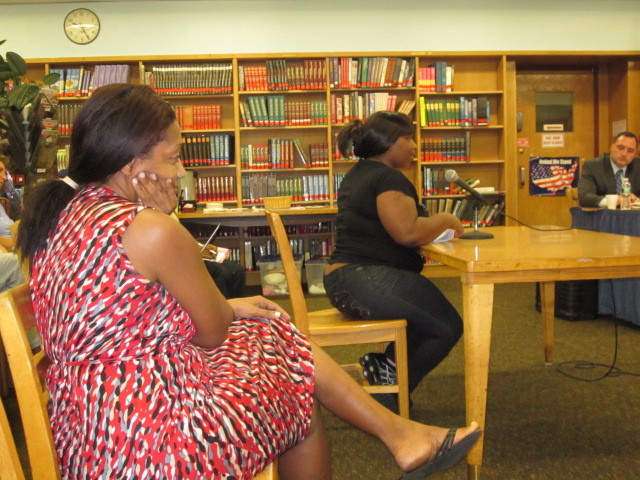Parents demand, receive help for kindergarten teachers
Adrianna DeAngelis fears that kindergartners at Malverne’s Maurice W. Downing Primary School will languish if their teachers remain without help. At the Malverne Board of Education’s first meeting of the school year on Sept. 13, a number of parents joined DeAngelis in expressing similar concerns about what they see as overwhelmed teachers — the result of budget cuts that led district officials to lay off six kindergarten classroom monitors and, at the same time, increase class sizes by two students to 22 per class.
“They have to have extra help in the classroom for these kids,” Latresha Nixon told board trustees and district administrators. “It’s impossible for one teacher to do it. … Something needs to be done.”
One woman emotionally described to district administrators how her daughter, a kindergartner at Downing, wet her pants because her teacher was too busy to notice that she had to go the bathroom, and the girl didn’t know whom to ask for help. “My child peed herself, didn’t tell anyone, because it wasn’t during the time that she was taken to the bathroom,” Althea Duhaney said in a quavering voice. “I cried for my baby because she was very hurt and embarrassed, and she came home wet.”
To avoid situations like these and to ensure that children get proper attention, Duhaney said, the district must address the matter immediately. “It’s really unreasonable not to have monitors to assist these teachers,” she said. “We’re not suggesting that it’s unreasonable that the classrooms are the size they are. What we’re saying is that it takes away from the teachers’ ability to have a plan.”
Schools Superintendent Dr. James Hunderfund said that monitors were among 50 positions the district cut last year, at a savings of about $75,000. Reinstating them, he said, was a financial consideration the district would explore.
Joann Krudis, whose son attends Downing, said that providing help in the primary grades now would save the district money it might otherwise spend on Academic Intervention Services later. Krudis, a fifth-grade special education teacher in Queens, said it is critical to provide help for teachers, particularly those working with such young students, in math and guided reading.
DeAngelis added that kindergarten “is the foundation,” while Malverne mother Hope Orfano said that teachers “set the tone for kindergartners for their whole educational careers.”
It is unrealistic to believe that one teacher can provide small-group instruction to 22 children, Krudis said, adding, “All educators know that’s when the true learning happens in terms of being able to target specific skills with the children.”
If the district cannot restore all six aides, the three women agreed, it should at least consider bringing back one or two to give the teachers some help during the day. The board trustees agreed, and decided to utilize five existing lunch monitors: Each will spend 90 minutes in a kindergarten classroom every day.
“We haven’t pinpointed where the funding will come from yet,” said Business Administrator Tom McDaid Jr., but he indicated that some money would come out of each line of the budget to pay for the monitors’ additional time. Board President Danielle Hopkins said that the district would also begin a search for “senior volunteers” — members of the community whose children do not attend Downing but who would be willing to help out in the classrooms.
“Something is better than nothing,” Krudis said. “With the 90 minutes that each teacher would be getting, I think that at least gives them some opportunity to utilize that time for small-group instruction, and that’s where you catch the little weakness … that the children come to school with and then you can target your instruction based on that.”
While the district will squeeze out the funding to address the problem this year, there’s no telling what will happen next year — depending on the economy and other financial factors, the district could face the same problem. Trustee Gina Genti told the concerned parents that, like them, she would love to see an aide in every kindergarten classroom, but that the financial state of the district and the state would likely make that impossible in the years to come.
“These cuts are not over,” Genti said. “It’s going to get worse. … Every single teacher and parent is going to be taxed down the line.”
That approach was unacceptable to DeAngelis, who teaches special education in Queens and has worked for BOCES and the West Hempstead school district. She said she believes that taking away from the youngest children will cost the district in the end, both financially and in its status as a high-achieving district. More importantly, DeAngelis said, it will cost the students. “I don’t want them to get lost,” she said. “I want them to progress.”
Overall, however, the parents appeared happy to get a quick response from the district to address the problem. “I was very pleased that our voices were heard and that something was done,” Krudis said. “I appreciate that as a parent because sometimes you feel that you’re speaking [to] deaf ears. I was thankful that something was done as quickly as it was.”











